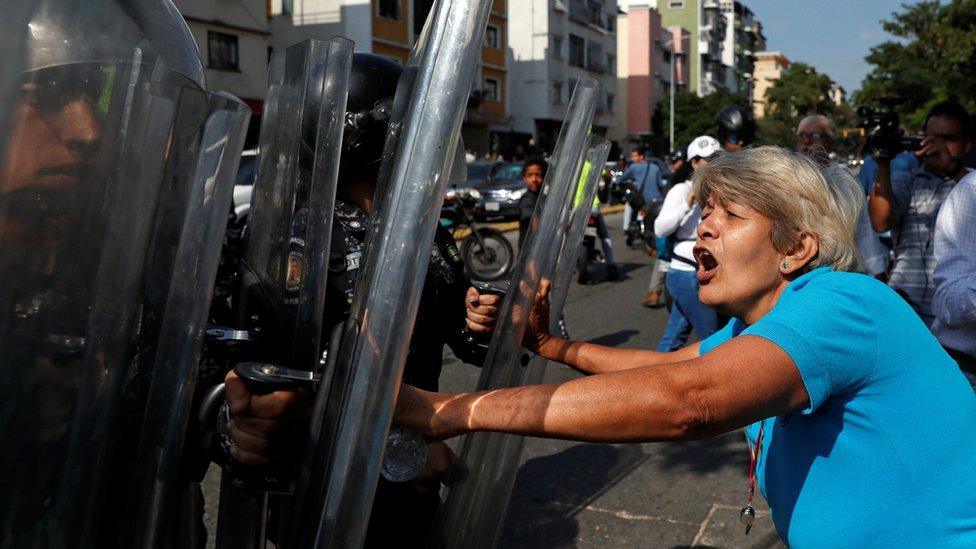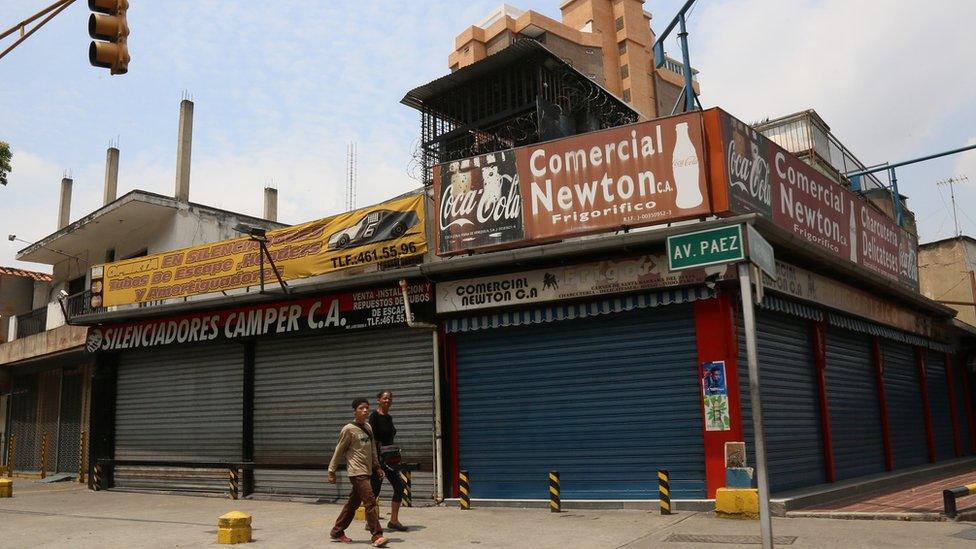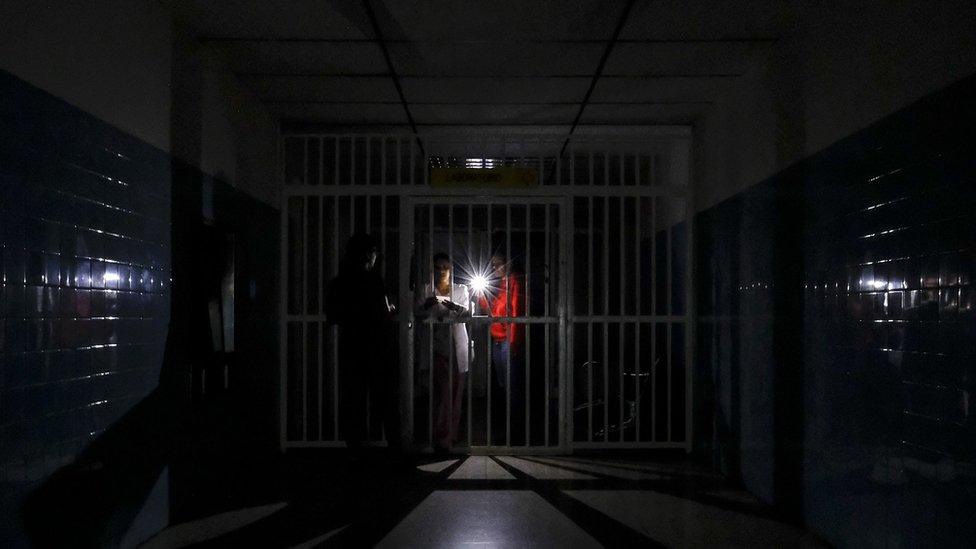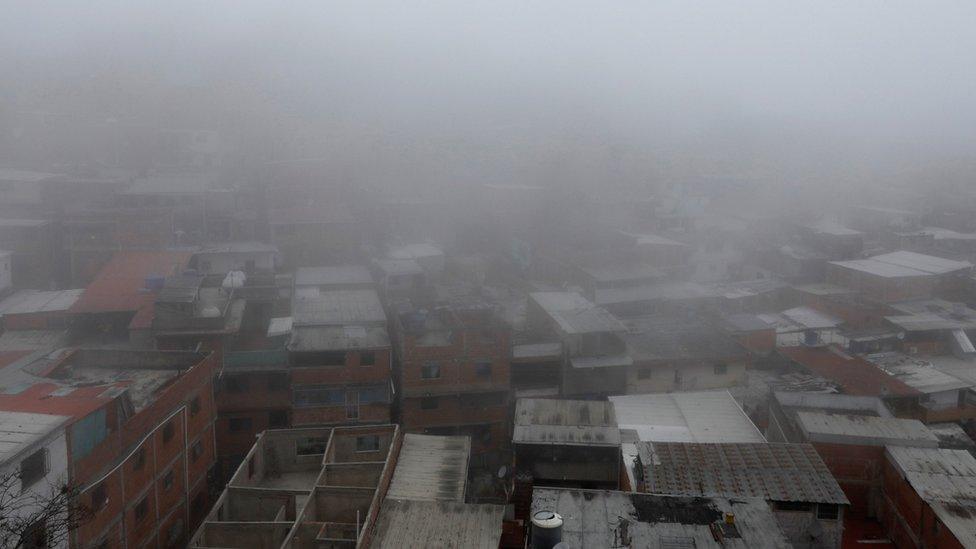Venezuela power cuts: Blackouts continue as protests loom
- Published
Much of the country, including Caracas, was plunged into darkness
A widespread power cut affecting much of Venezuela has continued ahead of planned protests on Saturday.
President Nicolás Maduro and the US-backed opposition trying to oust him have blamed each other for the outage.
Hospitals struggled to cope and at least one hospital patient died when her respirator stopped working.
The power cuts, which started on Thursday, have reportedly been caused by problems at a major hydroelectric plant.
Venezuela depends on its vast hydroelectric infrastructure, rather than its oil reserves, for its domestic electricity supply. But decades of underinvestment have damaged the major dams, and sporadic blackouts are commonplace.
President Maduro, however, has blamed the outages on "sabotage".
In a defiant tweet early on Saturday he vowed to battle the "brutal aggression against our people", adding: "We will never surrender."
Power supplies in Caracas appeared to be erratic on Saturday morning. Traffic lights in some areas were back in action but the city's metro remained closed, reports said. Fourteen of Venezuela's 23 states are still affected by the outages, El Nacional newspaper reported.

Opposition protesters confronted police in Caracas ahead of the march
Venezuelans, meanwhile, are bracing themselves for a weekend of pro- and anti-government protests.
Police were out in force on the road in Caracas where Saturday's opposition march was planned. Even before the rally began, some protesters were hit by pepper spray fired by officers, La Patilla news website said.
What happened with the power cuts?
On Friday, offices and school were closed to help efforts to restore electricity, Vice-President Delcy Rodriguez said.
Some hospitals saw chaotic scenes as relatives tried to move patients in the dark to other medical facilities with emergency power generators.

Many businesses in Caracas were closed on Friday
In Caracas's University Hospital, 25-year-old patient Marielsi Aray died after her respirator stopped working.
"The doctors tried to help her by pumping manually, they did everything they could, but with no electricity, what were they to do?" said her uncle Jose Lugo.
Generators at a Caracas children's hospital failed, with staff reportedly working overnight using their mobile phones for light.
"The children were very scared," Emilse Arellano, whose child's dialysis had to be cancelled, told the AFP news agency.
Will the blackout affect protests?
Mr Maduro accused the opposition of sabotage while his deputy, Ms Rodriguez, condemned what she called an "imperial electrical war".
Mr Guaidó hit back, urging Venezuelans to demonstrate on Saturday "against the usurping, corrupt and incompetent regime that has put our country in the dark".

Staff in some hospitals were forced to use mobile phones for light
He said the blackout was the result of years of under-investment and told a gathering marking International Women's Day that it could not be normal that "50% of hospitals in the country don't have an electric plant".
Mr Maduro has also called for a demonstration and tens of thousands of people are expected to participate in the two rallies.
However the BBC's Will Grant in Caracas says the blackout has affected public transport and mobility in the capital city and may have an impact on turnout.
Why do blackouts happen in Venezuela?
They are nothing new. Critics say they have been getting worse since the nationalisation of the power grid in 2007. In 2016, the problem reached such a critical level that the government declared a 60-day nationwide state of emergency.

This is the worst power cut in decades
In an attempt to stem the country's chronic power shortages, the government has periodically enforced controlled blackouts, where they would switch the power off for up to six hours at a time.
Critics say that far from helping, this has caused perishable food to go bad and crime to run rampant. And when unplanned blackouts - such as the latest one - have happened, officials have blamed a number of different outside forces, including animals such as iguanas entering hydroelectric substations.
What's the background to the political crisis?
Mr Maduro took over the presidency when his late mentor Hugo Chavez died in 2013. In recent years Venezuela has experienced an economic collapse, with severe food shortages and inflation reaching at least 800,000% last year.
The Maduro government is becoming increasingly isolated as more and more countries blame it for the economic crisis, which has prompted more than three million people to leave Venezuela.
Juan Guaidó was greeted by thousands of supporters on his return on Monday
Mr Guaidó, who leads the opposition-controlled National Assembly, declared himself interim president on 23 January and has been at loggerheads with President Maduro ever since.
He has been recognised as interim president by more than 50 countries but Mr Maduro retains the support of his close allies Russia, Cuba and China, among others.